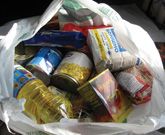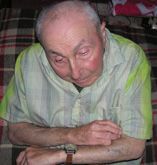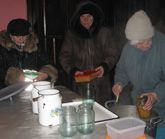×


We have detected your country as:
Please click here to go to the USA website or select another country from the dropdown list.
“Why do You forget us forever, and forsake us for so long a time?” (Lam. 5:20). These were the words spoken through the prophet Jeremiah, most likely voicing the lament of the Jewish people left behind after the destruction of the Temple by the Babylonians. Today, there still remain Jewish people left behind in Eastern Europe who must identify with this lament. These are most often the elderly and sick who cannot physically make the journey to Israel with their friends and family members. Without their support, life becomes more difficult and dismal than before.
Through Project Tikvah (Hope), Bridges for Peace has been supporting hundreds of elderly and ill Jewish men and women in Ukraine who enjoy few comforts. With the help of Christians there, we run three soup kitchens within Jewish communities that provide a hot meal five days a week for 108 individuals. Those who come are within walking distance.

Food parcel
However, not all in need can walk there; they are either too feeble or they live too far away and transportation is too expensive. In these cases, 308 packages of food are delivered to their homes once a month. They include basics such as flour, sugar, rice, and tea, cans of fish or meat, and during a Jewish feast, a little chocolate may be added.
Sometimes we’re able to give an extra gift to replace broken windows, purchase medicine, or provide means to measure sugar levels or blood pressure. During the harsh Ukrainian winters, heaters are provided for those who would otherwise freeze to death.
Stanislaw Gawel, who manages the project from Slovakia, tells how a Holocaust survivor was living in a single room without running water or electricity and an overflowing toilet. A snow storm prevented him and his team from being able to deliver food, and by the time they arrived, the man had died. He still sounds brokenhearted telling the story though it happened several years ago. Many more would surely die if it weren’t for our help.
The Jews of Ukraine have had a hard life—before, during, and since World War II. Before the war, around a third of the population was Jewish. One source reports: “For all Ukraine, the war years were ones of unparalleled violence, destruction and horror.” Over 5 million [according to some sources, as many as 7 million] of the country’s population died, of them 2.25 million Jews. In 1941, 34,000 Jews were shot by Nazi soldiers in just two days. Others were sent to concentration camps.

The Shema
One of the survivors being helped by Project Tikvah is 84-year-old Joseph Pinchas Levi. He’s from Beregovo (or Berehove) where there are few Holocaust survivors left. Some statistics state that 60% of the Jews of Soviet Ukraine and over 90% of the Jews of Galicia (an area in western Ukraine) were killed during the Holocaust. In 1989, the Jewish population stood at 487,000. In the 1990s, over half of them emigrated to Israel. By 2010, only 71,500 remained.
Stanislaw has visited Joseph many times and told us that Joseph “has a lot of stories to share. However, he is very emotional when he speaks about the Holocaust. It was not an easy time for him. He lost most of his family in the concentration camp in Auschwitz. It created a deep grief in him.” Joseph has shown Stanislaw his copy of the Shema (the Jewish prayer from Deuteronomy 6:4–9), which his family prayed when they were marched to the gas chambers. It is very dear to him because it reminds him of where he last saw his family.

Joseph Pinchas Levi showing his Auschwitz number
One of our soup kitchens operates out of the Beregovo synagogue where Stanislaw and his team enjoy a good relationship with the leader of the Jewish community. Joseph used to visit the soup kitchen regularly, but now he is no longer physically able to, so he receives a food package. Joseph knows that this food comes from Christians and is very grateful.
We are thankful that our European partners sincerely care for those they help. Though Stanislaw is from Slovakia, he and others on his team visit the soup kitchens every two to three months for two weeks at a time, as well as visit the homes of the house-bound. They listen to their stories, see how they live, and ask if they have any critical needs, fulfilling God’s mandate: “Defend the poor and fatherless; do justice to the afflicted and needy. Deliver the poor and needy…” (Ps. 82:3–4a).

Soup kitchen in Beregovo synagogue
The need for more soup kitchens is great. One area of 40 small Jewish communities has around 10,000 Jews who live in conditions we would feel are unlivable. Most of us come from countries that have not been as devastated as Ukraine. Though we may live in areas experiencing an economic downturn, most of us still live a far more comfortable life style than the poor Jewish people left behind in Eastern Europe.
Many of the laws in the Torah (Gen.-Deut.) command God’s people to take care of the poor. Other verses talk of God’s heart for them: “He raises the poor from the dust and lifts the beggar from the ash heap…” (1 Sam. 2:8). “But He saves the needy from the sword, from the mouth of the mighty, and from their hand. So the poor have hope, and injustice shuts her mouth” (Job 5:15–16).
In His Matthew 25 discourse, Yeshua (Jesus) said of those who minister to the poor, “Assuredly, I say to you, inasmuch as you did it to one of the least of these My brethren [the Jewish people] you did it to Me” (Matt. 25:40). Though most of our projects are for the Jewish people in the Land of Israel, we cannot forgot those still suffering who will never realize their dream to live here. Ask the Lord what He would have you to do for Yeshua’s brethren in Ukraine.
Blessings from Israel,
Rebecca J. Brimmer
International President and CEO
All logos and trademarks in this site are property of their respective owner. All other materials are property of Bridges for Peace. Copyright © 2024.
Website Site Design by J-Town Internet Services Ltd. - Based in Jerusalem and Serving the World.